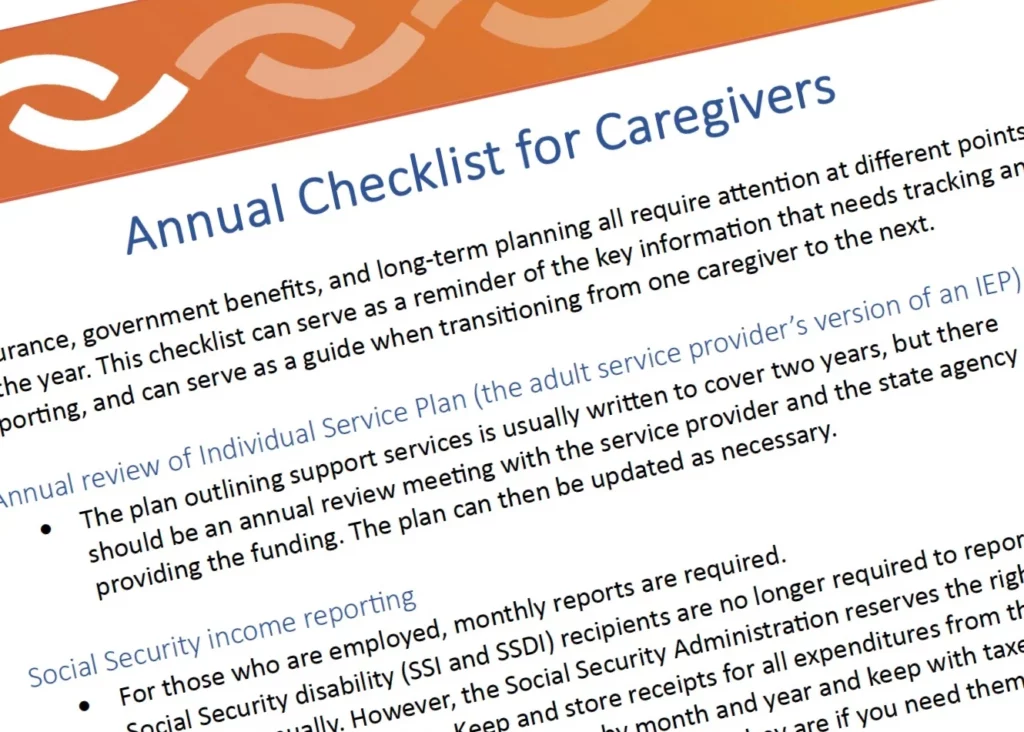organization
Keeping Important Paperwork Up to Date: A Checklist for Caregivers
Caregiving is a full-time job that includes not just keeping people fed, safe and happy, but making sure that financial, legal and social service supports stay in place.
Resource Details
Resource Format
Categories
Share:
Insurance, government benefits, and long-term planning all require attention at different points in the year. This checklist can serve as a reminder of the key information that needs tracking and reporting, and can serve as a guide when transitioning from one caregiver to the next.
Annual Review of Individual Service Plan (the Adult Service Provider’s Version of an IEP)
The plan outlining support services is usually written to cover two years, but there should be an annual review meeting with the service provider and the state agency providing the funding. The plan can then be updated as necessary.
Social Security Income Reporting
For those who are employed, monthly reports are required.
Social Security disability (SSI and SSDI) recipients are no longer required to report expenses annually. However, the Social Security Administration reserves the right to audit expenses at any time. Keep and store receipts for all expenditures from the Representative Payee account. Organize by month and year and keep with taxes for at least seven years. This way you know exactly where they are if you need them.
Annual Probate Reports for Guardians (varies by state)
The date for reporting varies from state to state because the laws governing guardianship are different. Often it’s on the anniversary of the date when guardianship was granted by the court.
Many states require a yearly expense report, so it’s helpful to have an organization system for keeping and filing receipts and expenses.
Letter of Intent
A Letter of Intent is a document many families include in their estate plan to help the next generation of caregivers understand the key supports and preferences of the disabled adult. (Learn more about letters of intent from Special Needs Financial Planning).
Everyone’s needs and preferences change over time. Review and update yearly to ensure the Letter of Intent reflects the most recent priorities in the life of the autistic person served by the letter.
Annual Medical Appointments
parent(s)/caregiver(s)
autistic adult
spouses, partners, and siblings, too
annual physical with PCP
dentist
optometrist
gynecologist/urologist
Medication Renewals and Refills
Some prescriptions require a new prescription from a provider on a monthly basis (example: stimulant medications). For many other medications, prescriptions can be written to allow refills for longer periods (up to a year). Schedule in-person visits so that they take place before prescriptions expire.
Open Enrollment for Private Health Insurance
Keep track of enrollment periods, as dates and opportunities vary. Some employers offer open enrollment at the end of the calendar year, while others may offer this window at the beginning or end of a quarter, such as in July or September.
Medicare and Medicaid renewal. Medicare always rolls over at the end of the year. For the most up-to-date information about coverage, contact them directly at 1-800-MEDICARE.
See also our resources on insurance:

DOWNLOAD
A list of things that are often required each year to maintain eligibility for benefits

More Resources
Find more information on legal considerations, navigating insurance, tools for managing information, and other key topics.





